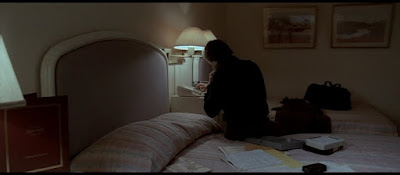 From Manhunter: FBI investigator Will Graham calls his wife, Molly, from his hotel room in Atlanta. To 'set himself up' for getting inside a killer's head (in this case, that of the 'Tooth Fairy'), Graham uses the people in his environment to manipulate his own state of mind. This is effectively what he's doing in this brief conversation with Molly. Immediately after the call, he enters the killer's mind while viewing the victims' home movies, and he then has an important insight which may help solve the killings. The basic idea is that Graham's using Molly to get himself 'wound up', so that he can be productive at his job.
From Manhunter: FBI investigator Will Graham calls his wife, Molly, from his hotel room in Atlanta. To 'set himself up' for getting inside a killer's head (in this case, that of the 'Tooth Fairy'), Graham uses the people in his environment to manipulate his own state of mind. This is effectively what he's doing in this brief conversation with Molly. Immediately after the call, he enters the killer's mind while viewing the victims' home movies, and he then has an important insight which may help solve the killings. The basic idea is that Graham's using Molly to get himself 'wound up', so that he can be productive at his job. From Collateral: Annie Farrell, an attorney, describes her courtroom routine to cab driver Max Durocher: "I represent the Department of Justice, and my opening statement is gonna fall flat at the most important point, and the jury's gonna laugh at me. And then I cry. I don't throw up. A lot of people throw up, I have a strong stomach. And then I pull myself together, I rewrite my opening statement, work my exhibits, and that's what I do for the rest of the night. That's my routine. And in the morning when [the trial] starts, I'm fine."
From Collateral: Annie Farrell, an attorney, describes her courtroom routine to cab driver Max Durocher: "I represent the Department of Justice, and my opening statement is gonna fall flat at the most important point, and the jury's gonna laugh at me. And then I cry. I don't throw up. A lot of people throw up, I have a strong stomach. And then I pull myself together, I rewrite my opening statement, work my exhibits, and that's what I do for the rest of the night. That's my routine. And in the morning when [the trial] starts, I'm fine." Will Graham and Annie Farrell are doing something we all do, whether we realize it or not: Each of us periodically uses his or her own situation or surroundings to 'spin himself/herself up', thus creating an internal emotional tension which provides a form of energy within our psyches; one which is necessary to lead a productive life. Without periodically invoking this tension, we would grow complacent, and would become less active.